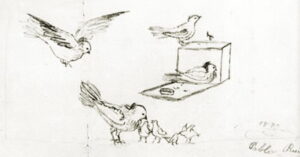
Gerd Altmann – Pixabay
by Debbie Burke
@burke_writer
Full disclosure: I’m lousy at social media.
My writing bona fides are respectable with six published thrillers, numerous nonfiction articles, and this wonderful gig on TKZ.
Yet, after three years on Twitter, I have a low three-figure following. Pitiful, huh?
Clearly, I’m doing something wrong.
Social media is that annoying stone in my already-uncomfortable marketing shoe. For contemporary authors, it’s a fact of life that we may not embrace but we can’t dismiss it either.
Recently, during an off-air discussion with TKZ regular Ben Lucas, he mentioned he was working on his as-yet-unpublished first novel and…
…he had more than 12,000 Twitter followers.
What???
How does a writer without a single book to sell develop such an impressive presence on social media?
I needed to know more. So I asked him.
His answers are today’s post.
Take it away, Ben!
~~~
Debbie: How has an as-yet-unpublished author collected 12K Twitter followers in less than a year?
Ben: First, I wanted to thank Debbie for allowing me to post on TKZ. I hope she keeps this line in so that you all know I’m grateful to be given the opportunity to share. This is a new personal high, and I hope to return the favor.
Technically, I’m a new author, but I’ve studied the craft for over a decade. Most of this is not new information, just good use of good advice. I have 12.5K Twitter followers, 9.8K on LinkedIn and another 5K on Facebook. These are the links:
The obvious question is, why am I doing this if I have no book to sell? It’s a line item of a giant checklist to help my future launch be successful. 2011, my first go around getting a book published was a disaster—many lessons learned. A big failure on my part was not using good advice or best practices.
But in 2020, (me having regrets), I listened to James Scott Bell on Great Courses. My immediate takeaway was marketing is crucial. That experience started my WIP, but also made me determined to brand myself. After more careful study, I started my social media building last December.
Marketing and branding are kind of related, but different. Marketing is the efforts you make to generate sales. But, branding is the business image you create. As I went along, I built my social media base to create goodwill and credibility whenever I can, (e.g. branding).
For the record, I have no illusions, as I’m keeping my hopes high and my expectations low. None of this is guaranteed, especially if my book comes out and SUCKS!
James Scott Bell says you can’t sell books on Twitter. I think he’s 100% right. If there is an effective marketing technique on social media, I haven’t seen it yet. Actually, besides announcing great deals, a lot of sales tactics on Twitter leave me feeling awkward and tacky. But, there are more important things that social media will offer you, which branding seems the best effort.
My overall goal is to not be forgotten before I even get started. Multiple experts helped to develop my approach:
Post something at least once a day. Twice maximum. Any less and you are forgotten. Any more than twice, you are a nuisance. (I’ve actually stopped following people because they constantly send out four posts an hour and I don’t have time to follow it all).
You can’t just publish text as a social media post. You need something visual that should have a common look/feel. Canva.com comes in handy.
You need to follow other people back. Following other people back on social media will help you get into an algorithm. In short, if you are connecting to other readers and authors, Twitter will also suggest you as a connection to other like-minded individuals.
One reason people are following me is because I’m asking them to. I’m soft, not pushy, but consistent. For example, my common lead for my posts, “I would appreciate your support/follow on Twitter—for more information about me and my upcoming projects sign up for my newsletter https://therealbenlucas.com/contact/ #readmore #writingcommunity #writing #quoteoftheday.”
Here’s an example of something created using Canva. I send out a visual quote every day similar to this one:

Debbie: Are all your tweets on writing/reading?
Ben: Yes. Everything I tweet or post is about writing or others in the #writingcommunity.
Debbie: Do you contribute to/take part in groups not related to writing/reading?
Ben: No. All my efforts are about writing. I’m making new friends and relationships. I’m finding this very rewarding.
Debbie: Did you already have an established following for some other interest?
Ben: No. None. I have lots of other interest but nothing I wanted to write about. Being an author is my passion, and I spend nearly all my free time pursuing it.
Debbie: How much time do you spend on social media each day?
Ben: I spend about an hour a day on social media (all three sites). I’ve become highly efficient—I had to, otherwise this can consume you like a shark devouring a guppy. Routine for me is important since I manage five people during my day job, have a wife, three kids, and a needy dog.
My daily routine is to wake up the kids, get people fed, go to the computer and post my daily thing. I’ll wish my followers a happy birthday or congratulations on their life events. I read TKZ, and if I can, add something to the conversations. After that, I do my day job and then try to write a thousand words between the remaining madness. At the end of the day, I interact online with some followers.
Debbie: What’s your day job?
Ben: I’m a Safety Manager for a construction company that services oil and gas. I have been in occupational safety and health for twenty-five plus years.
Debbie: How did you find your particular niche?
Ben: This question made me think of two different things.
- My niche for story telling came from my overseas experiences. I was in the UAE back in the early 2000s, working in one of the largest gas plants in the world. When the Arabs brought in the surface-to-air missiles, I thought it was time to leave. I was okay with the 50 caliber guns at the gate, but not the other stuff.
- My approach to branding comes from the safety profession and building and implementing management systems. I’m great at developing and measuring safety culture—which boils down to opinions. What I chase the most in my day job with our employees and clients is to shape their opinions. It’s an important part of business, which equates to building confidence.
If I do my job right, company culture is positive. Do it wrong, you have a negative impact or feeling.
Same thing goes here too, that I’m shaping my followers to feel good about connecting with me. My hope is my actions will lead to a positive opinion about who I am and what I do.
Debbie: You talk quite a bit about “brand.” Can you sum up in a sentence or two what your brand is?
Ben: For me, branding is two-fold.
I base my actions on four words which are sincerity, success, tolerance, and tact. (Posted on my Ted Lasso wall), my daily focus.
Brand statements to me are secondary, but I have one. “Ben Lucas is an author, rooted in thriller storytelling, who is inspired by the high and lows of the world oil industry.” For me, my brand statement will develop as my work matures.
Debbie: Do you ever attract “creepy” followers? If so, how do you handle them?
Ben: YES! This kind of stuff happens a lot to me because I tend to follow everyone back. But, don’t be afraid to follow other people. Be open to other like-minded individuals. If you follow others who are like-minded, you will build more followers. Connections can build even more followers and potential readers of your materials.
Overall, here are your best defenses:
Don’t follow people back if they appear to be scammers. I think there are some great articles on TKZ that go into a lot of details of what to look for.
Don’t answer back any direct or personal mail on social media, (like Twitter), unless you know the person. Social media is meant to be ‘social’ and you should communicate in group discussions or comments on posts. Once those conversations happen in private, things can get awkward fast.
Do not give out your personal details online.
You are in control—therefore, take control of the situation and block those people making things awkward. If it feels odd, be safe, block them, and make a report.
Debbie: Do you have a short synopsis of your upcoming book?
Ben: It’s called The Smoke Eater
(JSB Inspired Tagline)
Survival In a New Age of Extremism
When terrorist radicals are thrown into the mix, Reid’s new job turns deadly.
Desiring a fresh start, broken firefighter Reid Harris goes to Azurbar to work at the massive BuHasa facility. His new employer doesn’t care that he can’t pass the physical.
On his first day, Reid witnesses a stunning incident that determines his new norm. Martial law drives surging terrorism. He expected hard times, but now worries he can’t meet work demands. On top of Reid’s fear of dying on the job, a Azurbaree national with a vicious obsession further threatens his survival.
This is my working cover, which I made on Canva.com:
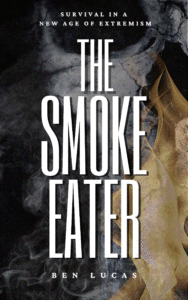
BTW – Recent posts on TKZ made me rethink my publishing strategy. My gut is telling me to buckle down and find an agent. I was inspired when I saw John Gilstrap’s video of his agent and editor being in sync with each other. He’s very fortunate to have people like that on his side. Going to start that process and see where it might take me.
~~~
Thank you, Ben, for sharing your well-thought-out strategy. You are setting yourself up for a successful launch. Let us know when that happens.
~~~
Social media sidebar bonus courtesy of Authors Guild member Joanna Malaczynski:
Social Media Market Share (Source: StatCounter)
#1 Facebook – Approximately 70% of the market
#2 Pinterest and Twitter – Approximately 10% of the market each
#3 YouTube and Instagram – Less than 5% of the market each (BUT SEE BELOW about the significance of YouTube)
#4 Tumblr and Reddit – Approximately 1% of the market each
Most Popular Search Engines (Source: Search Engine Journal and Visual Capitalist)
#1 Google – about 60.5 billion monthly visits
#2 YouTube – about 25 billion monthly visits
#3 Amazon – about 2.4 billion monthly visits (but used more as a search engine than Facebook)
#4 Facebook – about 20 billion monthly visits
~~~
TKZers: Feel free to share your social media handles in the comment section. Someone might want to follow you and you might find someone you want to follow.
~~~
Debbie Burke’s new resolution: tweet more about her series Tawny Lindholm Thrillers with Passion. Please check them out at this link. 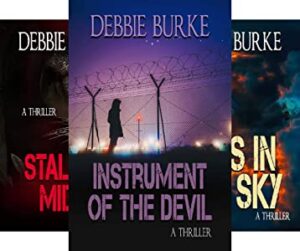













 A controversy over an award-winning female thriller author has broken out in Europe. That’s because the female thriller author doesn’t exist. “She” is really three men who have been writing under the pseudonym Carmen Mola. When one of their novels won a million-euro prize, the trio
A controversy over an award-winning female thriller author has broken out in Europe. That’s because the female thriller author doesn’t exist. “She” is really three men who have been writing under the pseudonym Carmen Mola. When one of their novels won a million-euro prize, the trio 

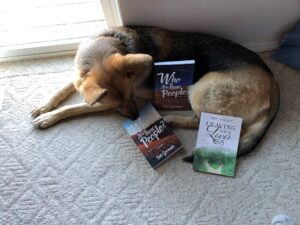
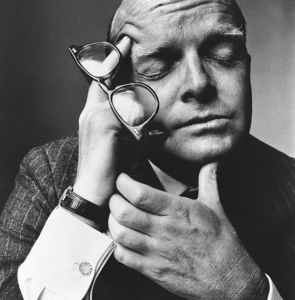

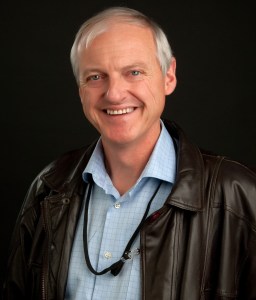 Garry Rodgers is a retired homicide detective and coroner with over three decades of experience in human death investigation. Now, Garry has reincarnated as a crime writer who regularly contributes to the Kill Zone.
Garry Rodgers is a retired homicide detective and coroner with over three decades of experience in human death investigation. Now, Garry has reincarnated as a crime writer who regularly contributes to the Kill Zone.
 brought with us, so eerie doesn’t quite touch the atmosphere at zero-dark-early. We walked into the first one or two of the operatories, looked around, checked our watches and began talking about how we might work our way back to the bus.
brought with us, so eerie doesn’t quite touch the atmosphere at zero-dark-early. We walked into the first one or two of the operatories, looked around, checked our watches and began talking about how we might work our way back to the bus.



